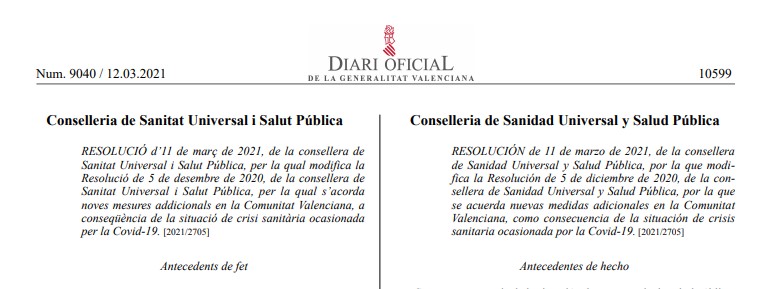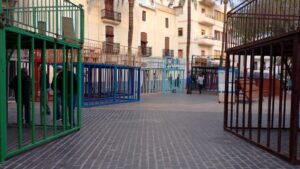TRANSLATION: Resolution regarding new measures in Comunidad Valenciana
Translation into English of the Official Gazette of the Generalitat Valenciana (DOGV) Number 9040, published on Friday 12th March 2021.

Saturday 13th March 2021 | translated by MIKE SMITH
This is a translation into English of the Official Gazette of the Generalitat Valenciana (DOGV) Number 9040, published on Friday 12th March 2021, which details the measures that have been modified and take effect from Monday 15th March.
MINISTRY OF UNIVERSAL & PUBLIC HEALTH
RESOLUTION of March 11, 2021, of the Minister of Universal Health and Public Health, which modifies the Resolution of December 5, 2020, of the Ministry of Universal Health and Public Health by which it is agreed new additional measures in the Comunidad Valenciana, as a consequence of the health crisis caused by Covid-19. [2021/2705]
Background
This section deals with the background to the COVID-19 pandemic and its evolution, especially over the past few months, together with the measures imposed by both national and regional administrations to face the health crisis. Due to its length (it runs over several pages), I have produced the following summary with the most relevant information.
When first ‘state of alarm’ declared in Royal Decree 463/2020 issued on March 14th came to an end in June 2020, the Generalitat Valenciana agreed a set of measures for the region which was necessary to face the ongoing health crisis caused by SARS-CoV-2. The agreement which established these measures noted that they would be subject to review based on the evolution of a predefined set of epidemiological and health indicators and that additional or complementary measures would be declared if they were necessary.
On October 25th 2020, Royal Decree 926/2020 declared a second ‘state of alarm’ and set out a series of restrictive measures related to the movement of people, the perimetral closure of regions, the declaration of a night curfew, and limitations on the gathering of people in private and public spaces and in places of worship. It also handed power to the regional governments to modify these measures as well as adopt additional restrictions that it deemed necessary.
The measures were determined after the publication of a Ministry of Health document “Coordinated response actions for the control of the transmission of COVID-19” on October 22nd 2020 which established five levels of alert in which a region could be placed: Alert Level 0 would be the ‘new normal’ in which a region suffered “sporadic cases” of infection and had a good working track and trace facility in place as well as a series of limited measures to reduce the risk of the the spread of infection. Alert Levels 1-4 would introduce gradually more restrictive measures based on an assessed risk and evidence on their efficiency to the reduce the spread of COVID-19.
The document included the main indicators for risk assessment and established thresholds based on those indicators to determine whether the risk is low, medium, high or very high.
Amongst them is the Cumulative Incidence (IA) rate which is the number of cases diagnosed in 14 days per 100,000 inhabitants. If the number of cases is between 50 to 150 the risk of infection spread is medium; if it is higher than 150, it is high; when it exceeds 250 cases per 100,000 inhabitants, the risk of the infection spreading through the population can be considered to be very high.
Following the recommendations of the European Council’s European Centre for Disease Control (ECDC), an IA threshold of 25 cases per 100,000 inhabitants was established above which it can be considered that the risk of infection spread is beginning to increase, as well as an upper limit of 150 cases per 100,000 inhabitants when it can be considered that the risk of infection spread is very high.
For Spain, an additional threshold was established in which an IA rate greater than 250 per 100,000 inhabitants would indicate an extreme risk of infection spread which would require additional actions to be imposed on the population if those implemented with an IA rate of more than 150 fail to control transmission.
A report published by the General Sub-Directorate of Epidemiology, Health Surveillance and Environmental Health on March 10th 2021 showed that there is a clear improvement in the situation in the Comunidad Valenciana. It added that the region as a whole is currently at Alert Level 2, a situation of “sustained and general community transmission with pressure on the health system”, whilst the IA rate for 14 days has dropped to 63.61 cases per 100,000 inhabitants. (It also notes that when the regional government published its last resolution on February 25th 2021, the IA rate was 202.77 cases per 100,000 inhabitants.
However, the pressure on the regional health service remains at a ‘high risk’ level, with 596 people in general wards and 363 in ICU wards, an occupancy of 4.93% and 17.22% respectively. According to Ministry of Health guidelines, the risk is high if the ICU bed occupancy value is between 10% and 25%.
In addition, the presence of new SARS-CoV-2 variants in the Comunidad Valenciana – (Variant B.1.1.7, known as the “British Variant”, and Variant B.1.351, known as the “South African Variant”) – remains a cause for concern. The British variant is known to be more infectious and increases the probability of a new wave of infections, whilst the South African variant, of which fewer cases have been detected in the region, is of particular concern due to evidence that vaccines are not as effective against it.
The measures adopted across the region since January have proved to be very effective, therefore it is logical to maintain them to minimize community transmission and reduce the risk as a ‘fourth wave’ of infections, albeit with a certain degree of flexibility.
It will be necessary to proceed with a slow and unhurried approach to de-escalation. The current situation makes it appropriate to gradually reduce the restrictions in the hospitality sector as well as for sports and exercise. However, they must be carried out with caution, especially with the approach of San José, a very traditional festival in many municipalities in the region, and Semana Santa during which there is traditional greater movement of people and greater social interaction.
Legal Basis
This section deals with the royal decrees and constitutional laws, both national and regional, that sets out the legal basis for the imposing the measures necessary to face a health crisis, and in particular the COVID-19 pandemic.
Those who want to read the full text of this section – in Spanish or Valencian – can do so via the link at the bottom of the page. But, for spaces purposes, I have decided not to include the entire text in this translation.
First Article
The following additional measures by sectors in the Comunidad Valenciana included in Resolution of December 5th 2020 are modified.
- Section 1 of the First Article of the Resolution of December 5th 2020 which relates to celebrations and events has been amended, confirming that events that involve crowds and the gathering of people are not permitted but that programmed cultural events, such as theatre and cinema, can take place so long as sufficient health protocols are in place and that 50% of the licensed capacity is not exceeded. Travelling shows (circuses) and parades are not permitted.
— - Section 4 of the First Article of the Resolution of December 5th 2020 which relates to wakes, vigils and funerals has been amended. Vigils / wakes can be held in any public or private venue with a limit of 30% of the licensed capacity of the venue up to a maximum of 20 people in outdoor spaces and 15 in closed spaces, regardless of whether they live together or not, with all health protocols guaranteed, including social distancing. Entourages for burials and cremations are restricted to 20 people in outdoor spaces and 15 people in closed spaces and limited to family members and close friends.
— - Section 5 of the First Article of the Resolution of December 5th 2020 which relates to celebrations has been amended. Non-religious ceremonies can be held in any public or private venue, indoor or outdoor, as long as one-third of the licensed capacity is not exceeded up to a maximum of 20 people in outdoor spaces and 15 in closed spaces, and limited to family members and closed friends. Celebrations in bars, restaurants, banquet halls and other hospitality venues or private spaces must comply with all the necessary regulations, and with a maximum of 20 people in open-air spaces and 15 people in closed spaces, limited to family members and close friends.
— - Section 6 of the First Article of the Resolution of December 5th 2020 related to parks, open-air recreation zones, children’s play zones, etc. has been amended. Parks, gardens and open-air recreation zones can open to the public with all the required health protocols observed, including social distancing, disinfection after the use of slides and other playground equipment, and those measures which prevent the gathering of groups of people. These areas will be closed during the hours of the night curfew.
— - Section 7 of the First Article of the Resolution of December 5th 2020 related to business premises and the provision of services has been amended. The capacity of premises is limited to 50% of the licensed maximum; if the business covers several floors, that same limitation will apply to each floor. Parking facilities provided at commercial premises are limited to 50% of their normal capacity. Shops must close at 8.00pm except those selling products considered as essential, such as food, beverages, hygiene products, pharmaceutical products, optical products, orthopedic products, hairdressing products and pet food products, but only for the sale of these products. In the case of those shops that sell different products in the same premises, each zone must be clearly marked off and limits respected for each product sector. Signage to show the direction of circulation of clients and physical barriers to mark off zones must be used. This doesn’t apply to supermarkets and other small food stores. The use of common and recreational areas in shopping centres is not permitted, except for movement between commercial premises.
— - Section 9 of the First Article of the Resolution of December 5th 2020 related to the hospitality sector has been amended. These apply to bars, restaurants, coffee shops, cafeterias in theatres and other leisure and entertainment venues, etc. The interior capacity of these venues is limited to 30% of the licensed maximum so long as there is adequate ventilation and air conditioning measures in place; this maximum capacity must be displayed at the door. Outdoor terraces can open to 100% of licensed maximum; an outdoor terrace is an uncovered space or any covered space that is surrounded by a maximum of two side walls or awnings. The maximum number of people of each table or group of tables is four and there must be a minimum of 2 metres between tables inside the venue and 1.5 metres on the terrace. Clients must be seated at a table to consume food or drink, and face masks must be worn when not eating or drinking. The closing time of these establishments is 6.00pm.
The following are not permitted: the use of the bar, self-service or buffet services, smoking, dancing (indoors or outdoors), recreational activities or gambling at the table.
The following establishments are exempt from the closing time limit: those venues in hospitals and health clinics that are for the use of employees and companions / relatives of patients; those venues in hotels and tourist accommodation blocks that are for the exclusive use of clients; those venues in companies and workplaces that are for the exclusive use of employees; those venues in educational centres that are for the exclusive use of teaching and non-teaching staff and students; service areas on communication routes or places that are not considered as service areas but are close to or adjacent to main roads and communication routes that provide a service to personnel belonging to regular carriers and essential services.
Home delivery and takeaway services (with prior appointment) can be carried out during the establishment’s normal opening hours.
Discos, ballrooms, cocktail bars, late-night pubs, cyber-cafés, theatre cafes, concert cafes, live music venues must remain closed, whilst karaoke and sporadic and amateur performances continue to be banned. Public background music is allowed but dancing is not permitted in any establishment, both indoors and outdoors.
— - Section 12 of the First Article of the Resolution of December 5th 2020 related to the physical activity, sports competition and sports facilities has been amended. Sporting activities, outdoors and in open or closed sports facilities, can take place so long as they are without physical contact and practised on an individual or pairs basis. Individual sports, outdoors or in open or closed facilities, free or directed by a coach, can be carried out in groups of a maximum of four people, without physical contact, and maintaining social distancing as recommended by the health authorities. Face masks do not have to been worn in outdoor or open sports facilities if social distancing can be maintained. However face masks must be worn in spaces where people gather and where it is not possible to guarantee social distancing between athletes, other people or pedestrians. Face masks must be worn in closed sporting facilities.
Children of infant and primary school level may participate in after-school sporting activities and training with a maximum of 10 athletes in stable bubbles which avoid contact with other activities and training groups. Only individual sports and those without physical contact can be practised to guarantee required social distancing. Face masks must be worn in closed sports facilities. Sports activities and training must be carried out without spectators and companions of minors who participate in the activity cannot remain in the sporting facilities or the surroundings to avoid to gathering of people. Children of infant and primary school level are not allowed to participate in events and sporting competitions with the exception of those authorised in Paragraph 12.4 of the resolution.
Federated athletes (Campeonato de Deporte Universitario or Los Juegos Deportivos de la Comunitat Valenciana) can carry out sports training with the following limitations: training can only be carried out in established training bubbles which must avoid contact with other groups. Individual training without physical contact is preferred to guarantee social distancing as long possible. Spectators are not permitted to watch the training sessions or remain within the sports facilities and the surroundings to avoid the gathering of people.
12.4 – Sports Competition: all sports competitions, activities and events organised by public or private entities, in all sports categories, are not permitted except the following: official federated regional competition that grants promotion to national championships; official federated regional competition that are essential to obtain official classification for national championships; the professional Valencian Pilota competition as the highest category in the female category; official national and international professional and non-professional competition. The organising federation is responsible for developing its competition with protocols that guarantee the required health and safety measures to prevent the spread of COVID-19.
In open sports facilities (considered to be a space that is not covered, or a space that is covered and surrounded by a maximum of three walls), the maximum capacity is one person for every 2.25 sqm of floor space available for sports use. This calculation is applied globally and to each of the sports facilities in the sports centre. The capacity of non-sports services in the centre will be governed by their specific regulations. In closed sports facilities, the maximum capacity allowed will be 30% of licensed maximum or, if not applicable, one person for every 2.25 sqm of floor space available for sports use. Closed sports facilities must close at 8.00pm.
Swimming pools may open up to a maximum of 30% of licensed capacity of the facilities and the pool basin. If there is no established capacity, the maximum capacity will be one person for every 4 sqm of water surface.
Owners of sports facilities will be responsible for establishing the necessary measures to ensure that their users comply with all required health protocols, including the use of signs to mark the direction of movement within the centre as well as indicate the maximum capacity allowed. An access system will be required to prevent the gathering of people and shift system use to allow the practice of physical activity in safe and healthy conditions. The facilities must be cleaned and disinfected at least twice a day whilst equipment must be cleaned and disinfected after each use and at the end of the day. Changing rooms can be used with a capacity of 30% of licensed capacity.
— - Section 15 of the First Article of the Resolution of December 5th 2020 related to the residential homes and similar facilities, including students residences, boarding schools, camps and shelters has been amended. Common areas can be opened up to 30% of normal capacity and with all the required health protocols in place, including social distancing, hygiene, good ventilation and without buffet or self-service facilities. Shifts can be established for dining areas. In accommodation that offers rooms with communal services, those who don’t live together cannot spend the night in the same room or use shared facilities, such as kitchens.
— - Section 16 of the First Article of the Resolution of December 5th 2020 related to gambling has been amended. Casinos, bingo halls, slot machines, arcades and cyber salons remain closed.
— - Section 24 of the First Article of the Resolution of December 5th 2020 related to swimming pools and beaches has been amended.
Recreational swimming pools, those in hotels and tourist accommodation blocks, and in urbanizations, must respect the capacity limit of 30% of their licensed capacity, both in terms of access as well as use. Changing rooms can be used but the use of showers or water fountains is not permitted. Face masks must be worn at all times by everyone aged six years and above, except during bathing.
Beaches are open for walks and physical activities, always respecting the required health protocols for social distancing and hygiene, and within the limitation of the freedom of movement as well as the maximum number of people who can gather together. Face masks must be worn at all times by everyone aged six years and above, except during bathing.
— - Section 25 of the First Article of the Resolution of December 5th 2020 related to traditional fiestas has been amended. The closure and suspension of activities, establishments, spaces or centre where traditional festive activities are carried is maintained.
— - Section 26 of the First Article of the Resolution of December 5th 2020 related to people with functional diversity or mental health problems has been amended.
In relation to the centres for the elderly, the provisions of the ordinance carried out by the Vice-presidency and Council for Equality and Inclusive Policies will be followed, which establishes the action plan in the residences for dependent elderly people, the day centers, sheltered housing and the CEAM / CIM, of the Valencian Community, in the context of the health crisis caused by COVID-19.
In relation to the centres for people with functional diversity or mental health problems, the provisions of the ordinance carried out by the Vice Presidency and Ministry of Equality and Inclusive Policies will be followed, which establishes the action plan in the centers and resources aimed at people with functional diversity or mental health problems in the Valencian Community, in the context of the health crisis caused by COVID-19.
The opening of the centres and the resumption of activities, in spaces, referred to recreational centers for the elderly or activities in other socio-health centers, day centers and centers of functional diversity, will correspond to the competent administrations in the matter, in accordance with what the Vice-presidency and Ministry of Equality and Inclusive Policies have for their management
Second Article. Existing Measures
In everything not provided for in this resolution, and in what is compatible with it, the following will apply in the territorial scope of the Comunidad Valenciana:
- The measures that, in general, are established in the Decrees of the President of the Generalitat, in force at all times, of measures of the Comunidad Valenciana, as a consequence of the health crisis situation caused by Covid-19 of the declaration of the state of alarm activated by the Spanish Government.
- The Agreement of June 19th of the regional government, on preventive measures against COVID-19 (DOGV 20.06.2020), in everything that does not oppose this resolution.
- The Resolution of December 5th 2020, of the Consellera de Sanidad Universal y Salud Pública, by which new additional measures are agreed in the Comunidad Valenciana, as a result of the health crisis situation caused by COVID-19 (DOGV 05.12 .2020), in everything that does not oppose this resolution.
- The Resolution of December 9th 2020, of the regional ministries of Universal Health and Public Health and of Justice, Interior and Public Administration, by which additional measures related to nightlife venues are agreed (DOGV 09.12.2020) , in everything that does not oppose this resolution.
Third Article. Measures that remain without effect
The following measures and resolutions remain without effect:
- Points 11. and 13. of the First Resolution of the Resolution of December 5, 2020, of the Consellera de Sanidad Universal y Salud Pública, by which new additional measures are agreed in the Comunidad Valenciana, as a consequence of the health crisis situation caused by COVID-19 (DOGV 12/05/2020).
- The Resolution of January 19, 2021, of the Consellera de Sanidad Universal y Salud Pública, which establishes exceptional and additional measures in the area of the Comunidad Valenciana as a consequence of the worsening of the health crisis situation occasion nothing for the COVID-19 (DOGV 20.01.2021).
- The Resolution of January 29, 2021, of the Consellera de Sanidad Universal y Salud Pública, by which various resolutions of the Consellera de Sanidad Universal y Salud Pública are extended, as a result of the health crisis situation caused by COVID-19, and other exceptional measures are modified and added (DOGV 01.30.2021).
- The Resolution of February 25, 2021, of the Consellera de Sanidad Universal y Salud Pública, by which new measures are agreed, as a consequence of the health crisis situation caused by COVID-19.
Fourth Article. Collaboration
Transfer of this resolution to the Comunidad Valenciana Government Delegation, and to the Comunidad Valenciana Town Halls, for the purpose of seeking their cooperation and collaboration, where appropriate, through the security forces and the local police, for the control and application of the adopted measures.
Fifth Article. Sanctions Regime
Failure to comply with the measures of this resolution that will subject the inspection activity procedure and the sanctioning regime established in Decree Law 11/2020, of July 24, of the Consell, of the specific sanctioning regime against non-compliance with the provisions regulating prevention measures against COVID-19.
Sixth Article. Effectiveness
This resolution will take effect from 00:00 on March 15th 2021 and will remain in effect until 23:59 on April 12th 2021.
Information Source



